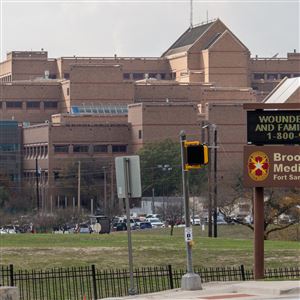Best known as the secretary of war under President Abraham Lincoln, Edwin Stanton first made a name for himself years earlier as the lawyer who helped to preserve Pittsburgh’s position as the hub of the steamboat industry.
Born Dec. 19, 1814, in Steubenville, Ohio, Stanton was the eldest of four children. He studied at Kenyon College in Ohio before passing the bar exam in 1835.
Stanton opened a law practice in his hometown in 1839 and quickly became a successful attorney, eventually serving as city solicitor. Looking to further his career, he moved to Pittsburgh in 1847.
The highest profile case of Stanton’s legal career came in 1850 when he went before the U.S. Supreme Court to represent Pennsylvania in a case against the Wheeling and Belmont Bridge Company.
Stanton argued that the Wheeling Bridge, built only 90 feet above the water, was too low for many ships to pass under, and cities upstream from the bridge, including Pittsburgh, would see the industries that rely on this key river route collapse.
The Supreme Court ruled in his favor and declared that the Ohio River was effectively a national navigable stream, establishing an important precedent which helped ensure open river commerce and also helped sustain Pittsburgh’s thriving economy.
The case lifted Stanton’s national profile and in 1856, he moved to Washington, D.C., where he became President James Buchanan’s attorney general.
When Abraham Lincoln took office, Stanton became a legal adviser before he was appointed secretary of war in January 1862, less than a year after the Civil War began.
Despite conflicting political ideologies, Lincoln greatly respected Stanton and frequently sought his advice and counsel. Stanton even tried to resign from his post toward the end of the Civil War, but Lincoln rejected the resignation, saying that Stanton would be a necessary and important part of Reconstruction.
After Lincoln was shot at Ford’s Theatre on April 14, 1865, Stanton rushed to the president’s side. When Lincoln died the next morning, Stanton famously remarked, “Now he belongs to the ages.”
Following Lincoln’s death, Stanton remained secretary of war under Andrew Johnson until 1868. Their relationship was contentious and Johnson’s attempt to remove Stanton from his position led to the president’s impeachment, the first such trial in U.S. history. After Johnson was acquitted by one vote, Stanton stepped down.
In the 1868 presidential election, Stanton campaigned for Civil War hero Ulysses S. Grant. After Grant took office, he nominated Stanton as an associate justice to the Supreme Court. Four days after his confirmation, Stanton died on Dec. 24, 1869 at the age of 55.
Several decades later, Pittsburgh commemorated Stanton’s legacy by naming Stanton Avenue and the Stanton Heights community in his honor.
Visitors to the Heinz History Center can learn more about Edwin Stanton and other prominent Western Pennsylvanians during the Civil War as part of the long-term exhibit “Pittsburgh: A Tradition of Innovation.” For more information, visit www.heinzhistorycenter.org.
First Published: November 19, 2015, 5:00 a.m.














